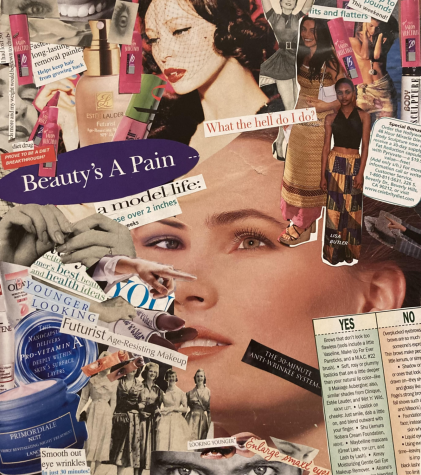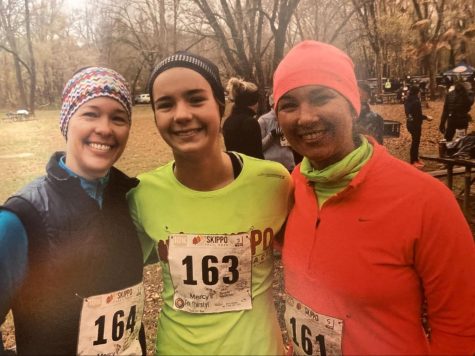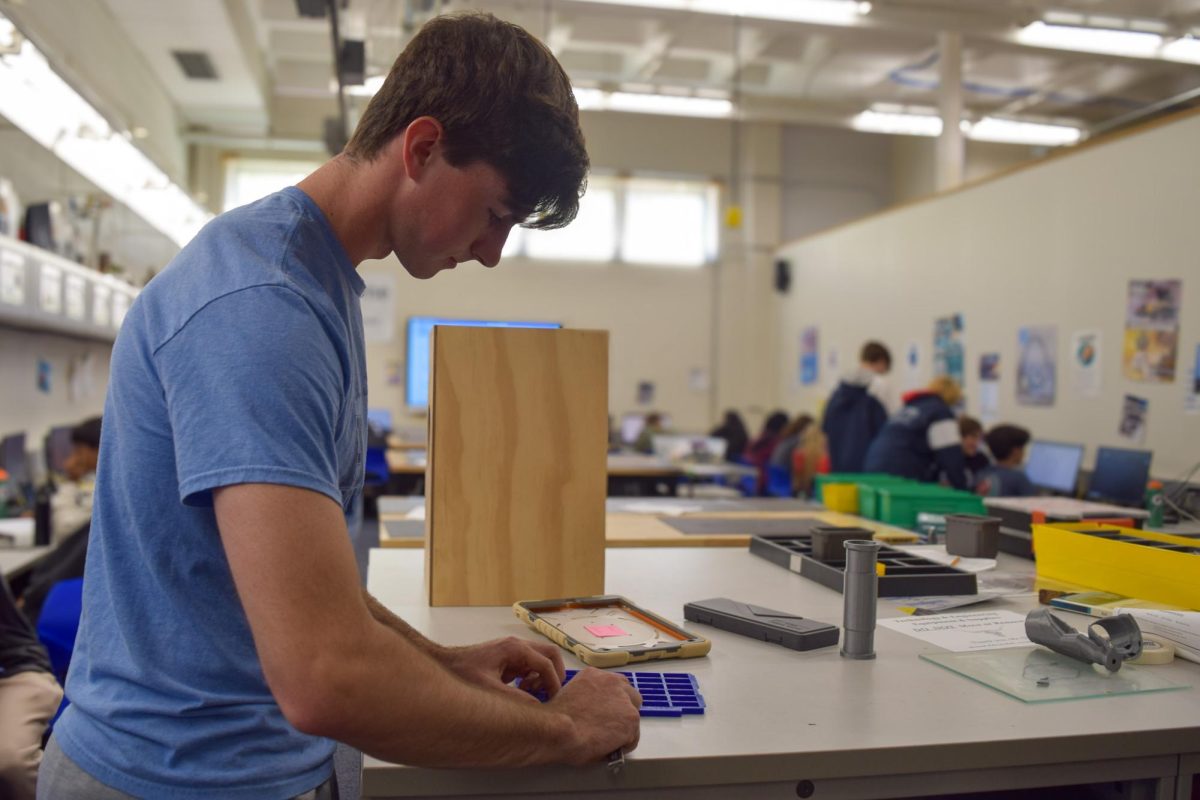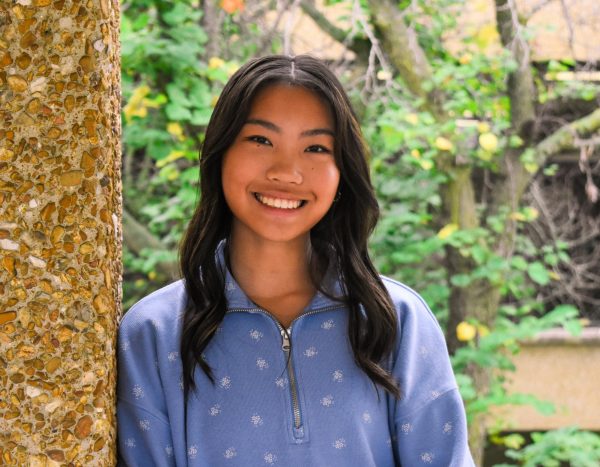Growing up under the influence of diet culture was a base for freshman Alexis Briner’s healthy lifestyle to become harmful. In the summer of 2019, innocent thoughts to have smaller portions of food ultimately led to anorexia which worsened their anxiety and depression. After persevering for over a year in recovery, Briner now continues to have the strength and confidence to spread body positivity.
“When I was younger, I would hear people talking about diets. I remember this vividly, I think it was an aunt that was talking about her new diet. And I don’t even think she was trying to lose weight,” Briner said. “But for some reason, I just liked the idea of restriction and I was like, ‘When I’m older, I’m going to do that.’ And then it was so sad looking back on it because who aspires to diet, like what? In sixth grade, it clicked and I was like, ‘You know what, I could change what I’m eating or I have control over that.’ But you know, it wasn’t a good thing.”
During the early stages, Briner struggled to reach out and speak about her eating disorder.
“It was so hard for me to talk about I was restricting and stuff because I know that other people would be like, ‘Well, you’re healthy and you’re this and you’re that and you should feel fine in your body and there’s nothing wrong with it.’ Because I live in a body that’s pretty close to the beauty standard. So I felt like I shouldn’t be dealing with it,” Briner said. “I’d like withhold information about how little or how much I was restricting and that kind of thing. So it wouldn’t be as convincing when I told people what I thought I was struggling with.”
Before being forced into recovery, Briner’s whole life revolved around her eating disorder. Her only thoughts were about food, exercise or her appearance.
“The idea of going back to what I was, was just so scary because I didn’t like my body in the first place. I felt like gaining weight and mostly just eating the foods that I hadn’t allowed myself for the past year was also really scary,” Briner said.
A part of Alexis’ recovery was personifying her eating disorder and writing down what her eating disorder mind said and then disagreeing.
“It would be like, ‘You’re fat,’ and then I would be like, ‘you got to stop, that is problematic. You can’t say that.’ That shouldn’t be a bad thing. It shouldn’t mean anything about someone’s worth,” Briner said. “My eating disorder, [it] made me think these kinds of things [that’s] rooted in having to look a certain way and having to eat a certain way. [It] would marginalize people in like bigger bodies.”
Exposure therapy helped Briner in her recovery to conquer her fear foods, the foods she didn’t allow herself. However, it was difficult to let go of her “control”.
“It was not a fun year, but [retrying fear foods] was probably one of the worst points because it just feels like all that control that you gained [is] just flung out the window and you have to try these new things,” Briner said. “I thought that if I ate a bite of ice cream, I would gain 20 pounds, and then I’d become obese and die. Looking back at it, there’s so much to unpack because it’s just ridiculous. It’s just normal. It’s just food. It’s just fuel.”
There were a few instances Briner struggled with the mental distress that came with eating.
“I kind of reached my limit with new foods and this was really sad. [Once] my mom had to feed me [one] last egg, and I spit it out. It was just not a great moment because there I was, 13 years old and spitting out my food. It was really gross, but I’ve had to accept those moments because if I think about it, I was really distressed. That’s why recovery is so important— so that you can actually live life and not worry about your food,” Briner said.
Briner appreciates her parent’s support throughout her recovery.
“My parents helped me through a lot of tough meals when I was recovering. Trying new foods was probably the worst part of recovery because I had to try all these fear these foods that I built up in my brain to fear so much [from] diet commercials talking about ice cream and all these awful foods. I just internalized it so much, so trying to get over those was very hard. My parents helped me through a lot of it like they’d sit with me and if I just did not comply, they forced me to eat it, which doesn’t sound great, but [I] kind of needed it at that point,” Briner said.

Social media was a big help for Briner to embrace her own experiences because she was able to discover influencers sharing their stories who have recovered from similar situations like Brittani Lancaster and Victoria Garrick.
“[I admire] the fact that all the people I follow are super open when they do have bad body image days. They give you tips to overcome them, and they’re just such a nice source of positivity and realness that social media doesn’t always have,” Briner said. “But I think with social media, there’s a whole debate about whether it’s good or not, because it aided a lot in the beginning of my eating disorder and also in my recovery. It can be used to promote negative body focused diets and ideas and culture. I think if you’re mindful about how you use it, it can be a tool.”
Art also provided Briner a distraction from her eating disorder and it continues to do so today.
“The one thing that I did do, and this was really helpful, but I did an art club in middle school. We painted a mural and for some reason that was always really calming. I would listen to a podcast, and I just focused on painting and that was very, very nice and definitely necessary,” Briner said. “I’ve done a few sketches when I’ve had bad body image days and I think they usually help me and it kind of brought some solace.”
Briner enjoys running and exercise and feels that this helps her mental health.
“[Exercise] brought me a little solace during those hard times and it continues to still do that. But I think for different reasons. During my eating disorder, and during my recovery, where my eating disorder was still very prominent it was like, ‘Oh, this is helping me because it’s gonna undo the food that I ate.’ But now, I think I’ve learned to harness it in a good way where it’s used for endorphins and it’s actually beneficial. I’ve made sure [that] even as I have gone from intense activity to the next, I keep fueling my body,” Briner said.
Reflecting back, Briner has learned a few surprising things about herself.

“[I] just learned about the impact of how you see yourself and how it impacts other people. If you see yourself in a bad way, and you’re buying into diets and diet culture and different body enhancements, which not to say anything against anyone who diets or whatever, because, like I struggled with it, but if you think about it, you’re enforcing the idea that certain bodies look better and certain bodies deserve something better than others. And I just didn’t realize how much of an impact the way I saw myself could affect other people,” Briner said.
Briner advises to anyone experiencing something similar to persevere because it’s worth it all in the end.
“Stay strong because there were a lot of times that I wanted to give up. If you are able to recover from your eating disorder, life is just so much better,” Briner said. “On some days when I have worse body image, I’ll be tempted to revert to my old ways, and restrict or diet or even just weigh myself. But then I remind myself where the eating disorder got me and how it made my anxiety and depression worse. I didn’t hang out with friends and I wasn’t really enjoying life. It takes time and a lot of acceptance to be able to sit through those feelings instead of actually act on them.”


![Celebrating her journey, freshman Alexis Briner beams brightly with her family. Briner appreciates her parents greatly for their support during her journey with anorexia. “I was still in the depths of [the eating disorder] around the holidays. So there were a lot of meals and I remember I kind of panicked at a few of those. And so I would have to take time out and sometimes we'd have to leave the parties early. And then my parents would be upset because it was very time consuming, [but] they were troopers,” Briner said.](https://pwestpathfinder.com/wp-content/uploads/2022/02/briner-feat-900x705.jpg)
![Focused on providing exceptional service, sophomore Darsh Mahapatra carefully cleans the door of a customer’s car. Mahapatra has always believed his customers deserve nothing less than the best. “[If] they’re trusting us with their car and our service, then I am convinced that they deserve our 100 percent effort and beyond,” Mahapatra said.](https://pwestpathfinder.com/wp-content/uploads/2025/10/DSC_0018-1200x800.jpg)
![Sophomore Aleix Pi de Cabanyes Navarro (left) finishes up a soccer game while junior Ava Muench (right) warms up for cross country practice. The two came to Parkway West High School as exchange students for the 2025-2026 school year. “The goal for the [exchange] program is to provide opportunities for both Parkway students and our international exchange students to learn about other cultures, build connections and become confident, capable, curious and caring — Parkway’s Four C’s — in the process,” Exchange Program Lead Lauren Farrelly said.](https://pwestpathfinder.com/wp-content/uploads/2025/10/Feature-Photo-1200x800.png)

![Gazing across the stage, sophomore Alexis Monteleone performs in the school theater. The Monteleone family’s band “Monte and the Machine” has been releasing music since 2012, but Alexis started her own solo career in 2024 with the release of her first single, Crying Skies. “My whole family is very musical, [and I especially] love writing [songs with them],” Monteleone said.](https://pwestpathfinder.com/wp-content/uploads/2025/09/DSC7463-1200x798.jpg)
![Amid teaching a lesson to her AP Calculus BC class, Kristin Judd jokes alongside her students in their funny remarks. Judd has always enjoyed keeping the mood light in her classroom, along with on the volleyball court. “[I enjoy] that side talk where you see [or] overhear a conversation and chime in, or somebody says something funny,” Judd said.](https://pwestpathfinder.com/wp-content/uploads/2025/09/image-1200x730.jpg)
![Eyeing the ball, junior Ella McNeal poses for her commitment pictures at Clemson University. McNeal’s commitment comes after months of contact with top Division 1 soccer programs. “ It has taken a lot to get to where I am, but I know that [what] I've already been through is just the beginning, and I can't wait for what is to come,” McNeal said.](https://pwestpathfinder.com/wp-content/uploads/2025/09/IMG_4926-1200x900.jpeg)


![Senior Adam Zerega stands with senior Dexter Brooks by farm equipment. Zerega often worked with friends and family on his farm. “I've been able to go to my family's farm since I was born. I [spend] at least three weekends a month [on the farm], so I'm there all the time,” Zerega said.](https://pwestpathfinder.com/wp-content/uploads/2025/04/IMG_4872-1200x900.jpg)

![Leaning on the podium, superintendent Melissa Schneider speaks to Parkway journalism students during a press conference. Schneider joined Parkway in July after working in the Thompson School District in Colorado. “My plan [to bond with students] is to get things on my calendar as much as possible. For example, being in [classes] is very special to me. I am trying to be opportunistic [meeting] kids [and] being in [the school] buildings. I have all the sports schedules and the fine arts schedules on my calendar, so that when I'm available, I can get to them,” Schneider said.](https://pwestpathfinder.com/wp-content/uploads/2025/09/IMG_5425-1200x943.jpeg)

![Leaping through the air, senior Tyler Watts celebrates his first goal of the season, which put the Longhorns up 1-0 against the Lafayette Lancers. Watts decided to play soccer for West for his last year of high school and secured a spot on the varsity roster. “[Playing soccer for West] is something I had always dreamed of, but hadn’t really had a good opportunity to do until now. It’s [really] fun being out [on the field], and I’m glad I decided to join the team. It’s just all about having fun with the boys and enjoying what time we have left together,” Watts said.](https://pwestpathfinder.com/wp-content/uploads/2025/09/DSC_1951-1200x855.jpg)

![Junior Fiona Dye lifts weights in Strength and Conditioning. Now that the Trump administration has instituted policies such as AI deregulation, tariffs and university funding freezes, women may have to work twice as hard to get half as far. "[Trump] wants America to be more divided; he wants to inspire hatred in people,” feminist club member and junior Clara Lazarini said.](https://pwestpathfinder.com/wp-content/uploads/2025/05/Flag.png)
![As the Trump administration cracks down on immigration, it scapegoats many immigrants for the United States’ plights, precipitating a possible genocide. Sophomore Annabella Whiteley moved from the United Kingdom when she was eight. “It’s pretty scary because I’m on a visa. When my visa expires next year, I’m not sure what’s going to happen, especially with [immigration] policies up in the air, so it is a concern for my family,” Whiteley said.](https://pwestpathfinder.com/wp-content/uploads/2025/05/DSC_0077-7copy.jpg)
![Shifting global trade, President Donald Trump’s tariffs are raising concerns about economic stability for the U.S. and other countries alike. “[The tariffs are] going to pose a distinct challenge to the U.S. economy and a challenge to the global economy on the whole because it's going to greatly upset who trades with who and where resources and products are going to come from,” social studies teacher Melvin Trotier said.](https://pwestpathfinder.com/wp-content/uploads/2025/05/MDB_3456-1200x800.jpg)

![Pitching the ball on Apr. 14, senior Henry Wild and his team play against Belleville East. Wild was named scholar athlete of the year by St. Louis Post-Dispatch after maintaining a high cumulative GPA and staying involved with athletics for all of high school. “It’s an amazing honor. I feel very blessed to have the opportunity to represent my school [and] what [it] stands for,” Wild said.](https://pwestpathfinder.com/wp-content/uploads/2025/05/unnamed-6-1200x714.jpg)
![Red, white and blue, the American flag holds the values of our democracy. The fight that we once endured has returned, as student journalists and senior correspondents across the country are losing their voices due to government control. “[Are] the White House and [the] government limiting free speech [and] freedom of the press? Yes [they are],” chief communications officer of the Parkway School District and former journalist Elisa Tomich said.](https://pwestpathfinder.com/wp-content/uploads/2025/03/Untitled-design-14.jpg)

Anna Claywell • Feb 16, 2022 at 9:21 pm
Such an important and well-written article! Thanks for sharing your story, Alexis!